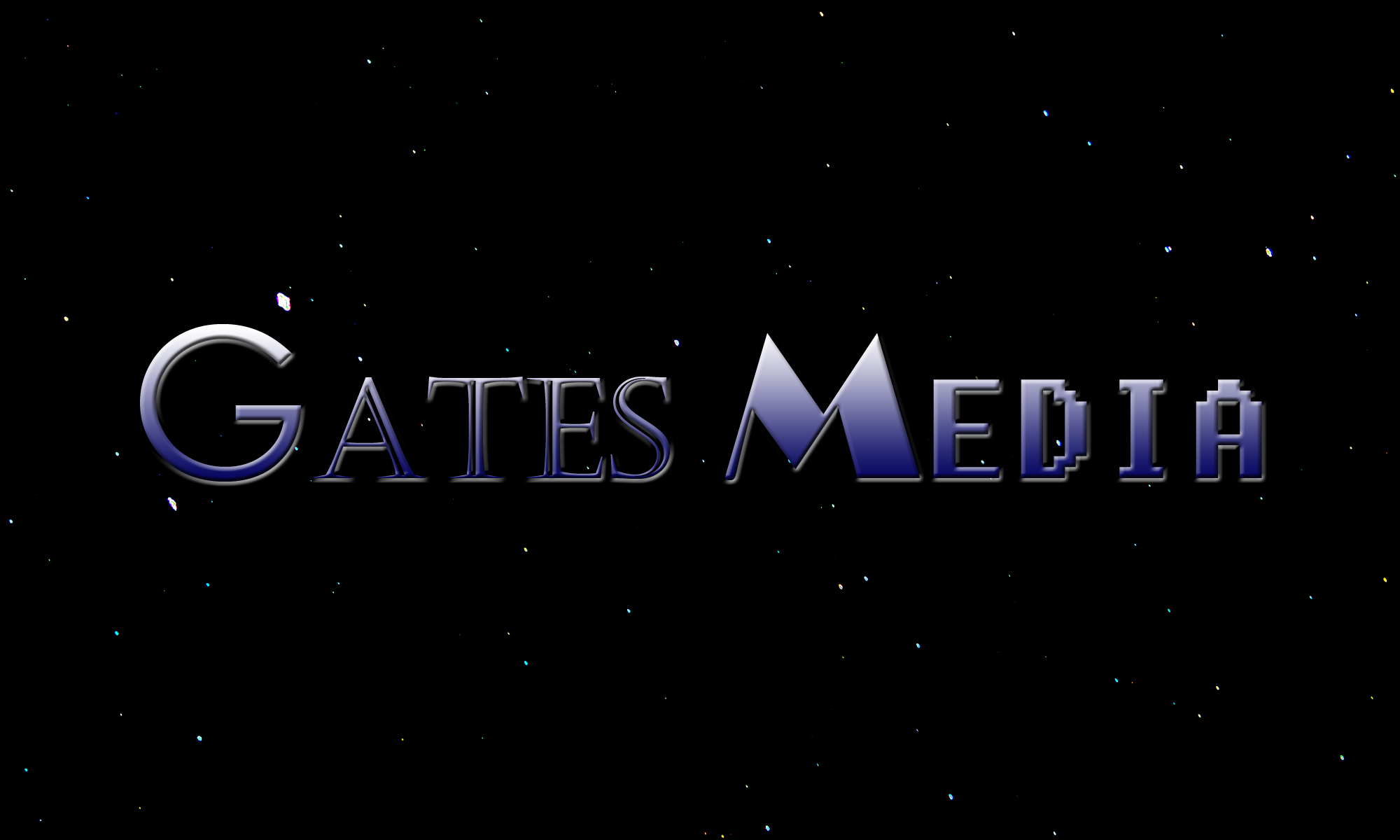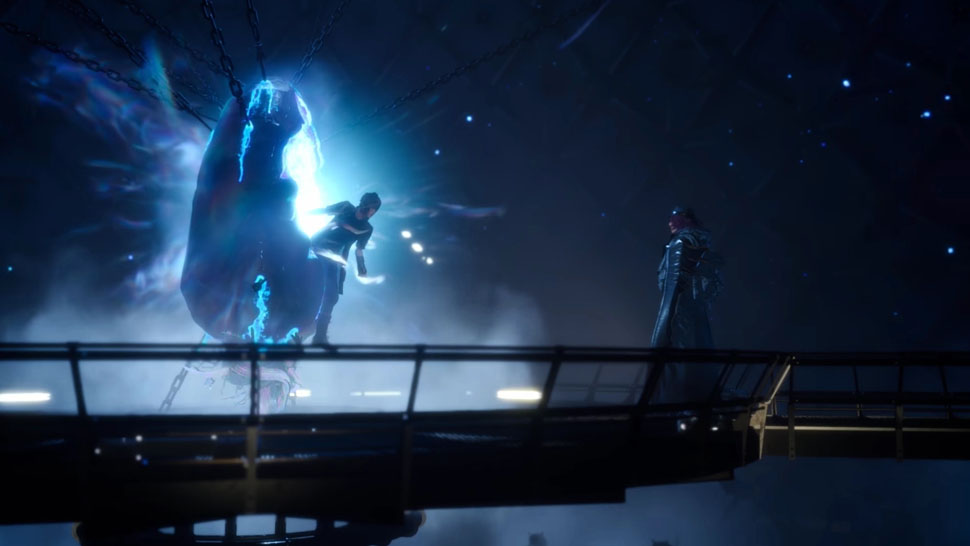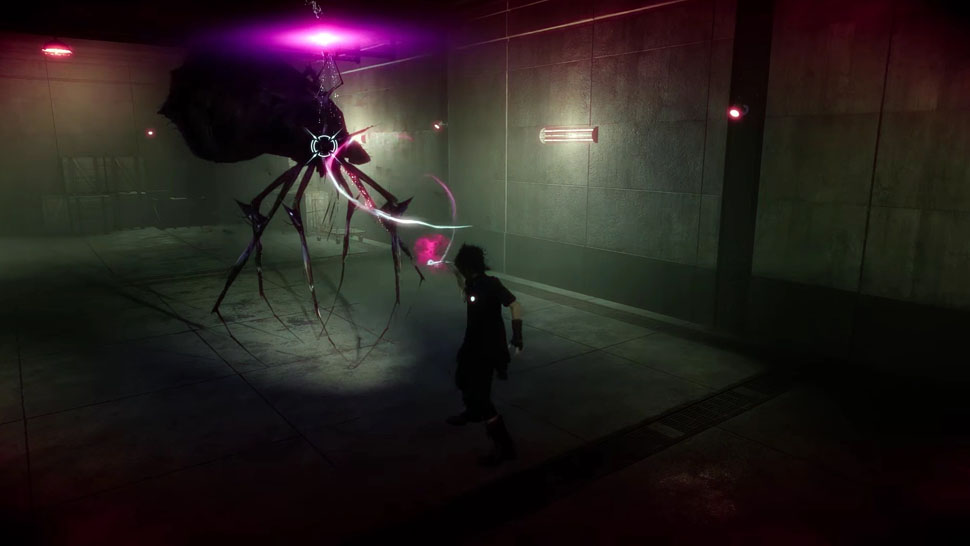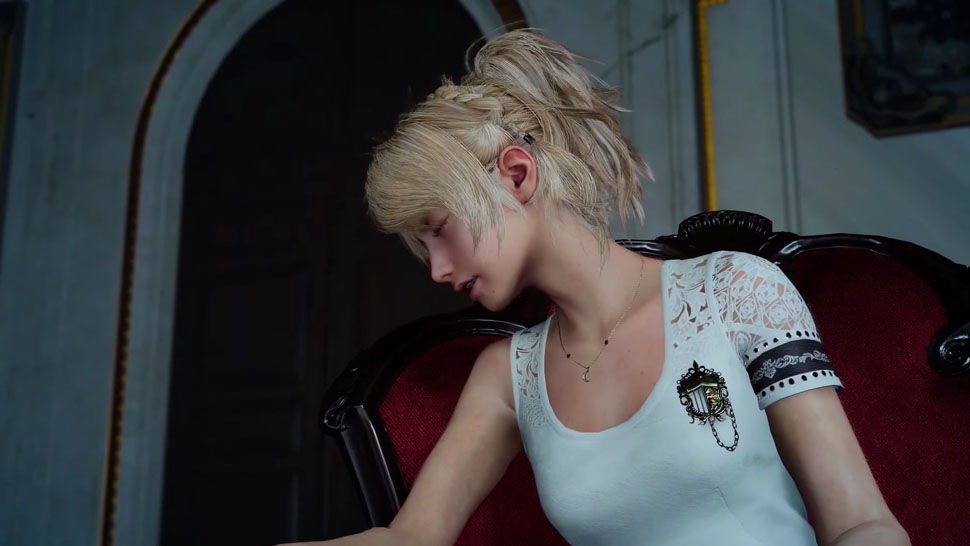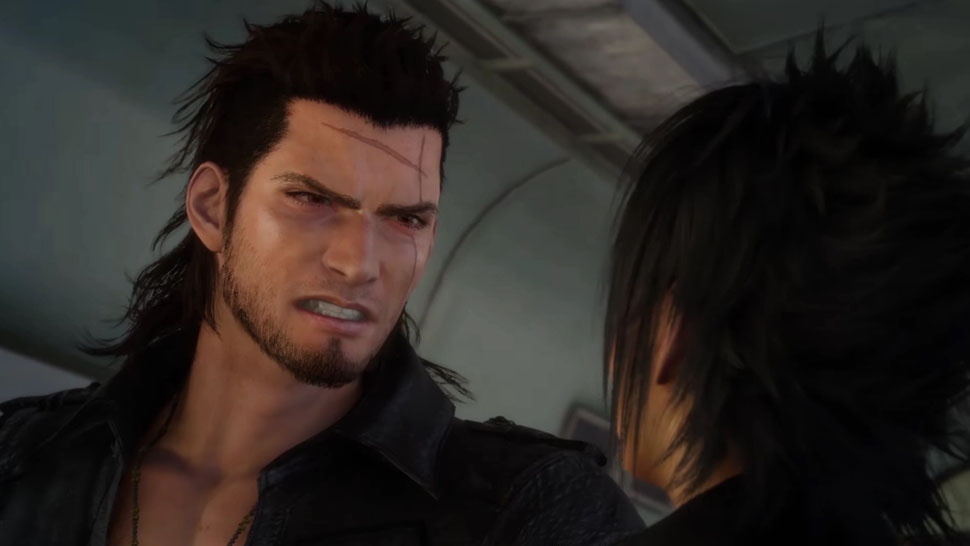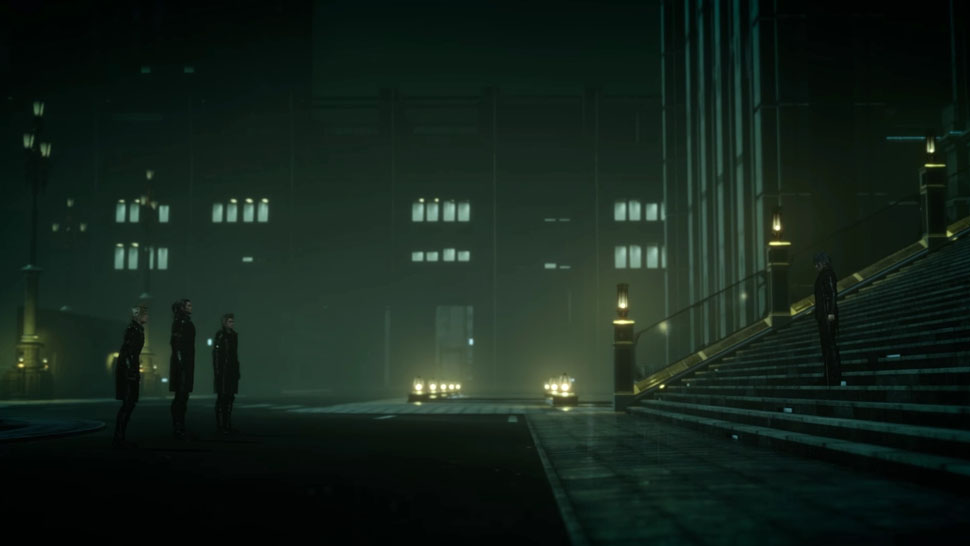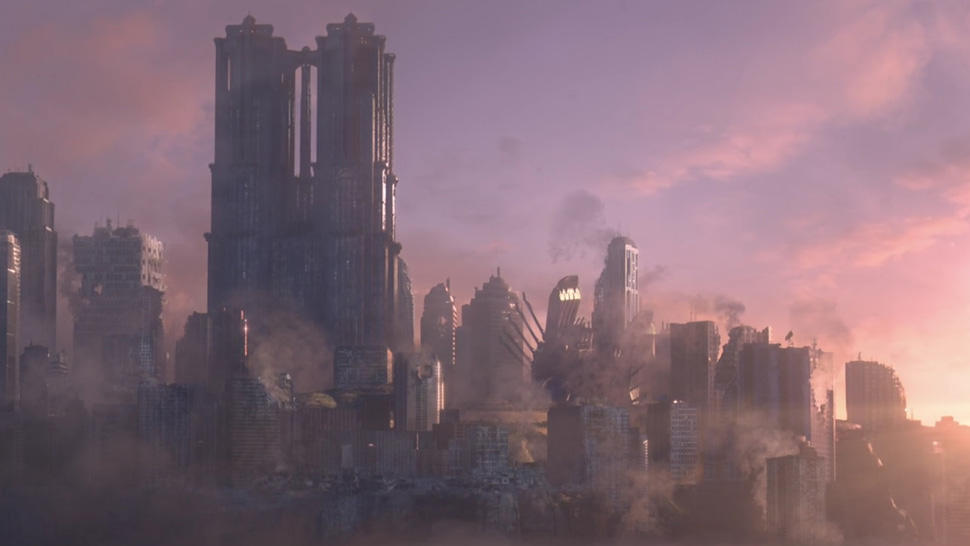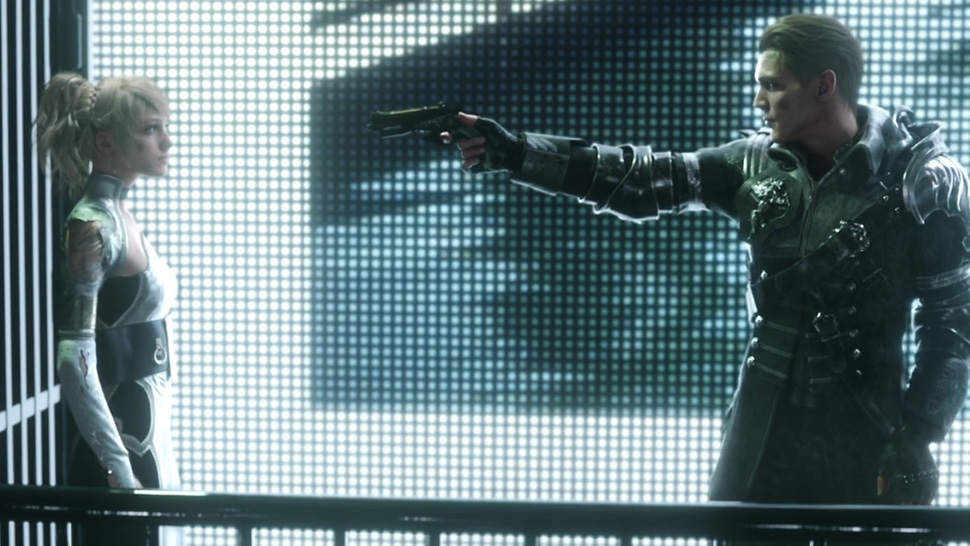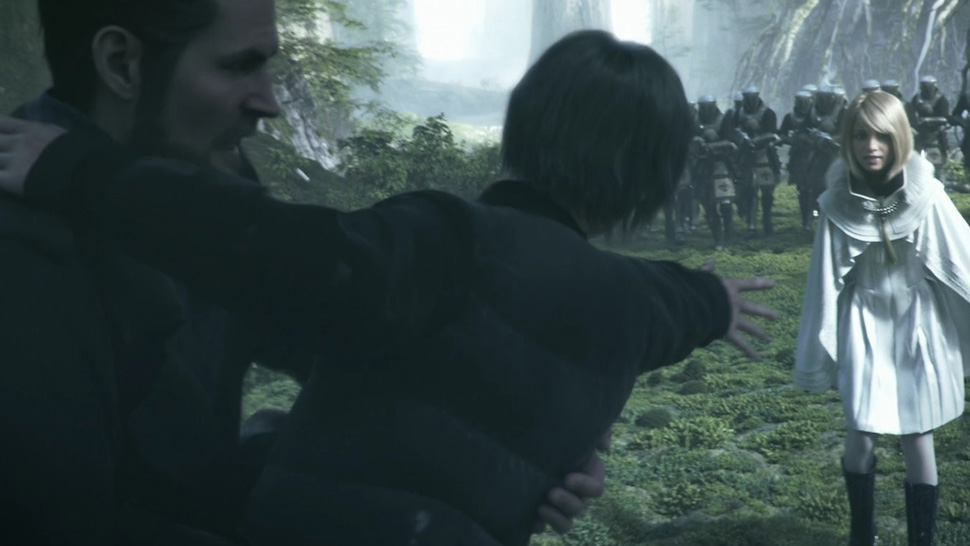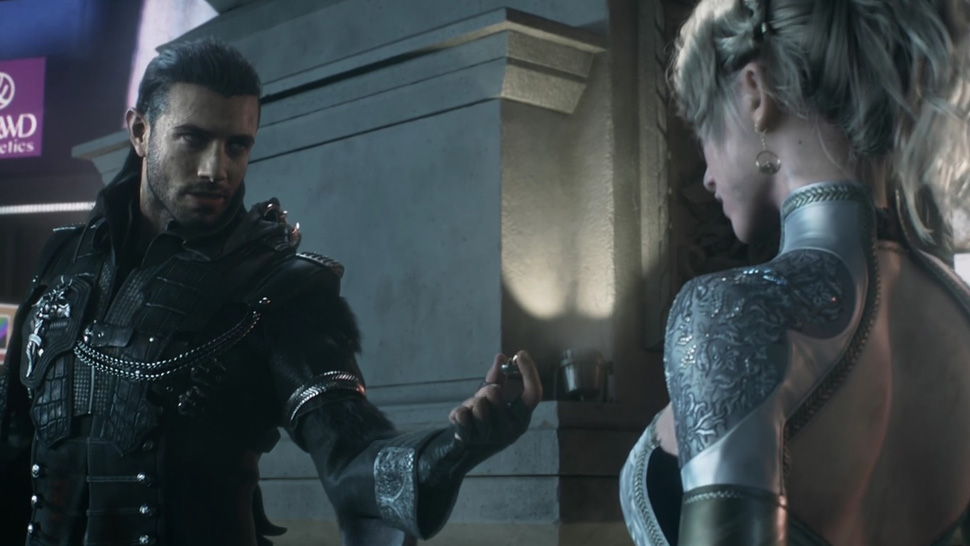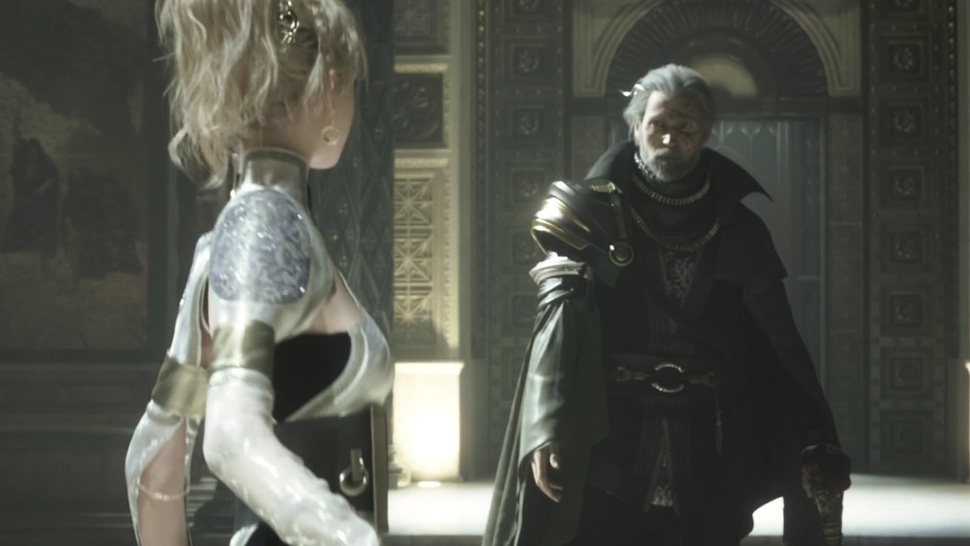Originally published on the Extra Life Community website
Edited by Jack Gardner
“Listen to my story.” Tidus, the protagonist of Final Fantasy X, opens the game with this line, and his voice carries its compelling tale to a thrilling conclusion. Fifteen years later, Square Enix released Final Fantasy XV and bet its protagonist Prince Noctis had a voice strong enough to carry a media franchise. The movie Kingsglaive showed Noctis’ home. The anime series Brotherhood introduced Noctis’ friends. The Omen trailer revealed Noctis’ worst nightmare. Final Fantasy XV would tell Noctis’ story… or would it?
Beware: this in-depth analysis of Final Fantasy XV contains spoilers.
Like how Tidus propels Final Fantasy X’s narrative, Noctis powers Final Fantasy XV’s. Almost every entry in the Final Fantasy XV franchise reflects his importance. The Omen trailer, which stars Noctis, depicts one of the series’ strongest creative visions, and his exclusion from the prequel movie Kingsglaive resulted in its pointless and convoluted story. Given this logic, Noctis’ story should be the franchise’s crown jewel, but many don’t even classify it as a good story in general. Unfortunately, the void Noctis left in Kingsglaive doesn’t end when the game begins. Noctis’ physical presence fails to compensate for his mental and emotional distance from the game’s events. Despite his appearance, he primarily functions as a vessel for the player. Such protagonists serve many games well, but when the story’s world, characters, and purpose rely on the protagonist’s actions and personality rather than the player’s, his absence spells disaster. Final Fantasy XV has many intriguing ideas and great potential to tell a rich story, but Noctis’ emptiness riddles it with character arcs that go nowhere, contradictions, and confusion.
Noctis Lucis Caelum begins as a sheltered prince selected by a magic crystal to purge the world of darkness. As part of a peace treaty between Noctis’ kingdom of Lucis and the empire Niflheim, King Regis sends Noctis to wed his childhood friend Princess Luna, or so Noctis believes. He embarks on his quest in high spirits with his loyal friends and bodyguards Ignis, Prompto, and Gladiolus, but with his journey barely begun, Noctis discovers the forces of Niflheim have destroyed his home and killed his father. Regis expected their betrayal and only sent Noctis away to protect him. Frustrated and distraught, Noctis wonders why Regis only smiled as he left without saying what Noctis needed to do as Lucis’ sole heir or as the crystal’s Chosen. Advisors and guardians tell Noctis to gather his ancestors’ powers and earn the favor of the Six gods to fulfill the prophecy his father died to help him achieve.
In response to the tragedy, Luna begins summoning the Six for Noctis to impress: Titan, Ramuh, Leviathan, Shiva, Bahamut, and Ifrit. As the Oracle, she speaks to the gods for the Lucian king. Before she can complete her duty though, Niflheim’s chancellor Ardyn Izunia stabs her to death. Greif-stricken, Noctis pauses his quest to visit Luna’s home Tenebrae, but his decision strains his friendship with his three companions. Additionally, his ancestors’ Ring of the Lucii, which Luna delivered to Noctis before her death, burdens his mind. Noctis begins seeing visions of Ardyn on the train to Tenebrae and attacks him with a blind need for revenge. When he finally throws the specter off the train, he realizes Ardyn has tricked him with an illusion into attacking Prompto.
Noctis, Ignis, and Gladiolus continue to the empire’s capital Gralea to retrieve the crystal and rescue Prompto from Ardyn’s grasp. The dangerous conditions separate them as soon as they reach the fortress though, and Noctis discovers he can’t summon his weapons, leaving him no choice but to wield the ring. While enduring Ardyn’s mockery and threats over the base’s intercom, Noctis fights his way to Prompto and the crystal. He pleads with the stone to help him stop the daemons, and to his surprise, the crystal pulls him into it. Bahamut greets him inside and reveals Ardyn as an ancient Chosen king. After banishing the darkness two thousand years ago by absorbing daemons into his body, the crystal saw him as tainted and refused to bestow him its power. When his people rejected him as well, he sought revenge by embodying the Starscourge, the darkness consuming the world. To banish the scourge for good, Noctis must wield the crystal’s power and his ancestors’ might to kill Ardyn. Noctis must sacrifice his life, however, to receive their strength. Ten years later, when Noctis’ ring has absorbed the crystal’s energy, he emerges from the stone to reunite with his friends, sacrifice himself to the prior Lucian kings, and defeat Ardyn.
The clues and lore littering Final Fantasy XV tease a thoughtful story, hint at deep themes and characters, and build players’ expectations for a satisfying conclusion. Overall, the game fails to deliver these promises, but its strongest elements show the potential Noctis’ story had if only he had told it.
His skepticism makes him stand out when duty and ancient texts motivate everyone around him. As a child, Noctis asks Luna challenging questions about himself. “If the crystal belongs to everyone, how come only Lucis gets to use it?” When Luna tells him only the chosen Lucian king can use the crystal to save the world, Noctis asks, “You really think I can do that?” Still without adequate answers, his skepticism follows him into adulthood. “Legend has it the King once stood alongside the Six to banish the darkness,” Ignis says. “‘Darkness’ seems awfully vague,” Noctis observes. “A king is sworn to protect his people,” Cor says. “And yet [my father] chose to protect only one prince,” Noctis responds. “Was that his calling? Forsake the masses to spare his own son?” The uninformative answers he receives make one wonder if Noctis’ advisors hide a dark secret from him, if the crystal belongs to Lucis, if it truly chose Noctis, and if Lucis somehow caused the spreading darkness.
Noctis does a poor job emphasizing Luna’s importance to him in the final game, but if used effectively, she had great potential to both motivate and corrupt him. Noctis spends the game’s first half pursuing Luna, always one step behind her. He begins with a journey to marry her but transitions to following the trail of gods she summons, knowing that each she calls drains her strength. Finally, he reaches her only to see Ardyn, a mysterious man of the empire, murder her. Luna, who even as a child understood Noctis’ destiny better than he did, dies with a smile on her face and Noctis’ secrets in her mind. As if Noctis pursued his nebulous destiny only for her, he laments, “All I wanted was to save you.” He puts his quest on hold, even refusing to wear the magical Lucian ring she died delivering to him. With his means of summoning the Six gone, he’s reached a dead end.
The first scene with Noctis after he grieves Luna’s death opens with him illuminated in a blinding ray of sunlight. While light often symbolizes goodness or clarity, the exaggerated and unnatural lighting in this scene creates the feeling that something sinister and dark festers in the king of light. Indeed, players soon learn Noctis’ rage and despair has driven him apart from his friends, and he looks at the ring as if it holds a malicious temptation he fights against satisfying. Bent on revenge and aggravated by Ardyn’s illusion magic Noctis chases Ardyn up and down the train to Tenebrae until he realizes he’s pursuing a figment of his imagination or, worse, Prompto.
The game offers a simplistic reason for Noctis’ lost abilities, but explanations with personal significance to him, derived from the clues presented within the game and surrounding media, instantly produce more satisfying scenarios. When his powers stop working and he learns Ardyn’s true identity, Noctis has even more reason to question his own identity and abilities. Losing his magic after his dark experiences on the train suggests that the scourge has corrupted him, leaving him unable to grasp the power the crystal grants him as a Lucian king. Perhaps the scourge begins as a darkness in the heart and then becomes a mental and physical disease. Such a condition could jeopardize his ability to fulfill his destiny.
The burden the ring has on Noctis’ mind and his use of it visually and audibly support that it corrupts him. When Noctis’ uses it, players hear whispering like that of demons in horror movies. The Ring of the Lucii glows red. Fire-filled cracks appear on Noctis’ face and arms. As if he’s opened the gates to hell itself, nearby daemons shrivel and explode out of existence. Streams of light flow into Noctis’ hand, and he receives a health boost, implying he’s absorbed their power. If he does absorb them though, what stops them from corrupting him as they corrupted Ardyn? Perhaps Ardyn used the ring to absorb daemons into his body two thousand years ago and has since passed it to the Lucian kings with the myth that it holds great power when in fact it corrupts the wearer.
Events in the Kingsglaive movie provide another alternative scenario for why Noctis loses his abilities. King Regis’ knights lose their magic when Regis dies because he lent them his abilities and can no longer power them after death. If Noctis weren’t a Lucian king, Regis could presumably lend him his power as well. When Ardyn reveals himself as Ardyn Lucis Caelum, he adds, “You’ll never guess who Izunia was.” Perhaps he means Noctis’ ancestors were Izunians who took the Lucian name after ostracizing Ardyn. Ardyn could have lent the fake Lucians his power to make them think they wield and protect the light. Now as part of his revenge, he crushes their hope of defeating him by revealing they never had any power to banish the darkness.
Noctis spends little on-screen time contemplating his destiny, but this simple action could have given him more agency and better tied the story’s loose ends. Inside the crystal, Bahamut answers the question Noctis has had since his father’s death. Perhaps his father and Luna hid so much and treated him so gently because they knew his fate. His desire to protect his friends from Ardyn, avenge those who have suffered under him, and redeem his own ignorance and corruption could give Noctis the determination to meet his death.
This interpretation of the game’s story may sound decent, but it accentuates and omits details to highlight its strengths. In reality, Noctis does not exist often enough to bring these themes and ideas to life. He has thoughts and emotions only often enough to contradict himself and alienate the player.
Noctis’ naivety quickly disappears, leaving players in the dust. He may not know much about the Lucian weapons he must collect, but he recognizes when Luna summons gods before players even know she can do that. He greets a mysterious lady Gentiana like an old friend and accepts more duties from her with little explanation as to who she is. Noctis takes it for granted that Ardyn can perform illusion magic, leaving it to loading screen text to explain it to the player.
He almost completely ceases questioning his duties in the same conversation where he shows the most frustration with how little he knows about them. Noctis wonders why his father would entrust protecting the people of Lucis to him when he hasn’t even bothered to prepare him for the task. Cor sates his frustration with, “He always had faith in you, that when the time came, you would ascend for the sake of your people.” Yet another synonym for “it is your duty.” Gladiolus questions Noctis at a couple future points, but players select Noctis’ response. He can either show ignorance and skepticism or resolve. These responses have no effect on the story though, making Noctis either a king who deeply questions his abilities but doesn’t care enough to investigate or a king who has resolved to save the world with a friend prone to pointlessly bickering with him.
Admittedly, the story doesn’t give Noctis many reasons to question his destiny anyway. Anyone else proclaiming themselves the Chosen, such as Niflheim’s Emperor Aldercapt and Luna’s brother Ravus, are obviously wrong or evil mustache twirlers. The moral ambiguity Lucis portrayed in Kingsglaive doesn’t continue far beyond it. The people outside Lucis’ capital city, who hated Regis’ decision to give their homes to the empire in exchange for peace in the film, don’t seem to exist in the game. Nothing suggests that Noctis’ mission has terrible consequences or actually makes the situation worse. No one has an alternative method to ridding the world of darkness, so Noctis and his friends must try this one by default, even if they didn’t have prophecies to assure them they have chosen the correct path.
Noctis’ lack of contemplation, however, results in a boring and insincere tale. Noctis pauses his journey, not because he legitimately questions his identity and actions, but because the whiny prince sets his arbitrary duties aside to mope. Noctis doesn’t lose his powers because his ancestor sent him down a path of corruption or because he never inherited Lucis’ gifts. He loses his powers because a random Niflheim invention disables him when someone turns it on. Supposedly, Noctis’ tale stars a prince who must get rid of his “slack jaw” and become a king, but by the game’s end, Noctis has matured only by growing a beard. His ever-increasing power and continuing blind belief in a prophecy hardly count as wisdom. Showing his contempt for introspection and critical thinking, he doesn’t wonder where the Starscourge originated or if he can find a way to defeat Ardyn without killing himself just because his ancestors demand it.
While the idea of a prince pursuing his love across the land only for revenge and solitude to corrupt him sounds compelling, Noctis delivers it poorly. He and his friends discuss the burden Luna carries just ahead of them but only while the player explores the world. Luna slowly weakening and potentially dying receives less emphasis than Ignis announcing that he’s come up with a new recipe, and Noctis and his friends discuss it as lightheartedly as his terrible driving habits. Ravus arguably mentions her struggles in a cutscene when he says to Noctis, “You receive [Ramah’s] blessing. And yet you know nothing of the consequences.” He doesn’t make it clear, however, if his warning refers to Luna’s condition, and Noctis and his friends don’t care enough to wonder. Poor Luna receives so little attention that players can easily miss these details and see her as a distressed damsel who faints into armchairs for no reason.
Noctis not only doesn’t care about Luna’s burden, but also, he doesn’t care that she carries it for him. He laments Luna’s death not because her duty to serve him sapped her strength until it killed her but because a bad guy decided to stab her. Like a cliché, he laments that he couldn’t save the woman he loved instead of wondering why yet another person who understood his destiny sacrificed herself without telling him how to proceed. Gladiolus is too busy calling him a mopey teenager for either of them to notice that Noctis can’t contact the remaining three gods to complete his quest. Ardyn murdered the one person who can summon them. Fortunately, Shiva decides to reveal herself by freezing Noctis, Gladiolus, and Ignis half to death for no reason. Bahamut and Ifrit also reveal themselves unprovoked. Thus, Luna becomes an inconsequential side note in Noctis’ journey.
In fact, Noctis’ indifference belittles and muddles most of the story’s biggest revelations. Ardyn’s illusions could make a prince, who already questions his destiny, question his senses and the people around him. Instead, Ardyn’s random and pointless use of his abilities mostly just annoys Noctis. Noctis struggles desperately while the crystal slowly absorbs him, but then, he contentedly spends the next decade hibernating inside it. Ardyn reveals himself as a Lucian king, but Noctis doesn’t reflect on what that means for his own identity. Players spend the game collecting the weapons, souls, and powers of thirteen dead kings, the favor of six gods, and a magic ring and crystal only to discover that Noctis still has to die to gain the power to defeat Ardyn. Everything Noctis does seems like a pointless ritual to prove himself the Chosen when everyone already knew that. His arrogant ancestors apparently think the Lucian line can end, and they will never need to defend the world from the Starscourge again. But Noctis doesn’t see his destiny as unfair or arbitrary nor does he so much as wonder how much his father or Luna knew of his fate.
Without Noctis, even Final Fantasy XV’s blatant brotherhood theme doesn’t quite translate in the end. The infamous Chapter 13 attempts to emphasize the importance of Noctis’ friends through their absence. Noctis wanders Gralea’s scary and lonely corridors while Ardyn taunts him for his powerlessness without his companions. Ardyn can’t convince anyone, however, with Noctis opening hellish portals and exploding daemons into screaming fireballs, which Noctis doesn’t find at all disconcerting by the way. Ardyn also tries to torment him with illusions, but rather than becoming paranoid and desperate, Noctis recognizes the tricks and snarls with annoyance.
These failed tactics instead reveal the uselessness and superficiality of Noctis’ friends to the story. Noctis fights and defeats Ardyn by himself. His strength comes from kings, gods, rings, and crystals, not from the brothers around him. He doesn’t need them to tell him to do his duty. He doesn’t need them to tell him to move past Luna’s death. He never refuses to continue his quest, and he wears the ring on his own terms. He doesn’t need them to help him separate reality from illusion. He doesn’t need them to save him from corruption. They don’t transform him from a prince into a king, if he didn’t leave the castle as a king from the start. He doesn’t fear facing Leviathan, Bahamut, or Ardyn by himself. He cries the final time he sits around a campfire with his companions, but why? Does he wish his journey didn’t end in a path he must walk alone? Does he think of the hole his death will leave in his friends’ hearts? Does he mourn the life he will never know with them by his side? Is he only grateful they walked with him this far? Without Noctis to define what they mean to him, Ignis, Prompto, and Gladiolus exist only as replaceable clichés to entertain players on their journey.
Final Fantasy XV asks the player to “reclaim your throne,” not to “reclaim Noctis’ throne,” and for this reason, unlike Tidus, Noctis never has the chance to say, “Listen to my story.” The game contains elements of an emotional and compelling tale, but Noctis’ emptiness transforms it into a shallow and confusing one. Players who can project themselves into Noctis and fill the gaps around him with their own speculation and experiences can fall in love with the world, its ideas, and its characters. The players looking for Noctis’ story, however, will only find the void he left behind.
